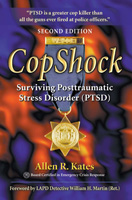
CopShock: Second Edition
Surviving Posttraumatic Stress Disorder (PTSD)
by Allen R. Kates, MFAW, BCECR
Women-Only Police Associations
To address issues that female officers
experience on the job, there is a need for women-only groups. Studies show that
women officers subjected to sexual harassment, sexism and prejudice are
vulnerable to acquiring PTSD. Women officers are more stressed-out and have
higher burnout rates than men.
With a high attrition rate, women officers find that hostility in the workplace is making them sick. A San Francisco police department study concludes that they become more physically exhausted and are more jittery and irritated than male cops. They experience more headaches, backaches, stomachaches and sleep problems.
At the same time, studies also show that women are exceptional at defusing potentially violent situations, and save departments money because they are rarely named in excessive use-of-force lawsuits.
International Association of
Women Police (IAWP)
Since 1915, the IAWP has advanced the
interests of policewomen, visualizing “a world where women working in the
criminal justice professions are treated justly, fairly, and equitably by the
agencies they serve.”
Spanning the globe, the Association provides a
network of support and training for every woman in the criminal justice system,
as well as mentoring, peer support, scholarships, networking and
resources.
Go to: http://www.iawp.org.
National Center for Women
& Policing (NCWP)
Although female officers have proven
themselves as good defusers of potentially violent situations, women account for
only 13 percent of police officers across the country. The National Center for
Women & Policing (NCWP) promotes increasing the numbers of women at all
ranks of law enforcement as a strategy to improve police response to violence
against women, reduce police brutality and excessive force, and strengthen
community policing.
Among the NCWP’s projects are training, networking,
internships, leadership development, law enforcement assistance programs,
research conferences and more.
Go to: http://www.womenandpolicing.org.
Women In Federal Law
Enforcement (WIFLE)
WIFLE promotes gender equity through its
leadership education center that provides training, research, scholarships,
awards, and networking opportunities in partnership with law enforcement
agencies, members and supportive sponsors. Among its goals are assisting
agencies recruit, retain, train and promote women in federal law enforcement.
The website offers the latest news affecting women federal law enforcement,
studies, job availability and more.
Go to: http://www.wifle.org. Write: WIFLE,
PMB-204, Suite 102, 2200 Wilson Blvd., Arlington, VA 22201. Phone:
703-548-9211.
Women Peace Officers
Association (WPOA)
Formed in 1928, the WPOA of California
provides a forum of continuing education and training. It cultivates an
atmosphere that encourages camaraderie and an open exchange of ideas.
The
organization offers scholarships for law enforcement personnel, supports the
Peace Officer’s Memorial in Sacramento, monitors legislative information and
offers awards for professional achievement and valor. This association serves as
a model for female officers wishing to form their own groups.
Go to:
http://www.wpoaca.com. Write: WPOA,
PO Box 589, Sacramento, CA 95812. Phone: 909-698-6216.